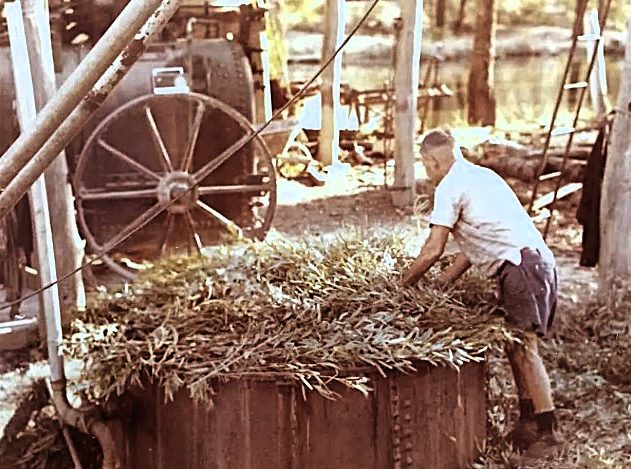
The Davis family has been using coppicing techniques for harvesting blue mallee at their West Wyalong property since the 1960s. Photo: GR Davis Pty Ltd.
A centuries-old land management practice in rural NSW is on the brink of collapse, as farmers from West Wyalong confronted state lawmakers this week over what they say are flawed and damaging regulations.
Member for Cootamundra Steph Cooke hosted a special presentation at NSW Parliament House on Wednesday (28 May), urging policymakers to reconsider the state’s “pink mapping” designations that have left long-standing farmers in legal uncertainty.
“Pink mapping” is the informal term for land classified as Category 2 – Sensitive Regulated Land under the Native Vegetation Regulatory (NVR) framework.
On official maps, these areas are shaded pink – hence the name.
The designation aims to protect environmentally sensitive vegetation, including threatened ecological communities, and is primarily based on satellite imagery and modelling.
Once land is pink-mapped, activities such as clearing or disturbing native vegetation may require permits or be prohibited altogether.
Landholders found breaching these rules face heavy penalties.
However, producers in the Bland Shire argue these satellite-based classifications are not only inaccurate but also threaten their livelihoods and a long-standing industry built on coppicing — a traditional, low-impact, regenerative technique where shrubs and trees are cut back to ground level to encourage healthy new growth.
This method enables continuous harvesting without harming the plants or the ecosystem, and is used to produce fencing materials and essential oils.
Two native Australian plants, blue mallee and broombush, have been sustainably managed through coppicing since the 1930s.
In West Wyalong, this practice has become a way of life, with some family-run businesses operating continuously for generations.
“We’ve got families who’ve coppiced broombush and blue mallee for generations — cutting by hand, taking only what’s needed, and letting it regrow naturally,” Ms Cooke said.
“Now they’re being told they can’t touch their land because a satellite says it’s sensitive.”
While the practice is long recognised as sustainable and environmentally responsible, under current regulations, landowners are receiving legal threats simply for continuing what they’ve always done.
One of yesterday’s scheduled speakers, third-generation farmer Bailey Lynch, sought to clarify how coppicing differed from land clearing.
“The accusations of illegal land clearing are beyond ridiculous,” he said.
“We never do blanket harvesting – everything is done by hand, taking only what’s needed and leaving little to no footprint. This situation is ripping families’ livelihoods apart, and the stress, anxiety and depression that come with it are something I wouldn’t wish on anyone.”
For families like the Wheatley-Hawkins, who have farmed the region since 1909, the uncertainty is more than financial — it’s deeply personal.
Gaye Hawkins says her family’s fencing business, reliant on broombush harvesting, has been “strangled” by pink mapping rules.
“My husband died fighting this, and I’m still fighting for our land and our right to work it,” she told the West Wyalong Advocate.
Farmers also challenge the accuracy of the mapping data underpinning these classifications.
In one case, a vegetation type declared critically endangered was mapped as covering only 200 hectares across the region, yet a single property was found to contain 800 hectares of the same ecosystem.
“If the data is wrong, the entire policy is built on sand,” Ms Cooke said.
Richard Davis, owner and manager of Australia’s oldest and longest-running eucalyptus oil production company, GR Davis Pty Ltd, has been a long-time harvester of mallee for eucalyptus oil.
He says he has been locked out of his land for more than 100 days with no response from the Department of Climate Change, Energy, the Environment and Water (DCCEEW).
“We’re stuck in limbo. No answers, no income, no clarity,” he told local media earlier this year.
Ms Cooke said the presentation was geared to cut through bureaucratic confusion and put a human face on the policy.
Representatives from NSW Farmers, the Country Women’s Association and the NSW Irrigators Council attended, as well as several state parliamentarians.
Ms Cooke stressed that she supports environmental protections but believes a balance has been lost.
“This is not land clearing. This is not deforestation. This is sustainable, smart land management refined over generations. We need a regulatory system that recognises that,” she said.
For the communities of West Wyalong, the stakes are high.
Beyond the maps, classifications and satellite images lie families who have built their lives around a practice that feeds them and supports their towns.
“The bush will regrow,” said Bailey Lynch, “but I don’t know if we will, if this continues”.
Original Article published by Edwina Mason on About Regional.


